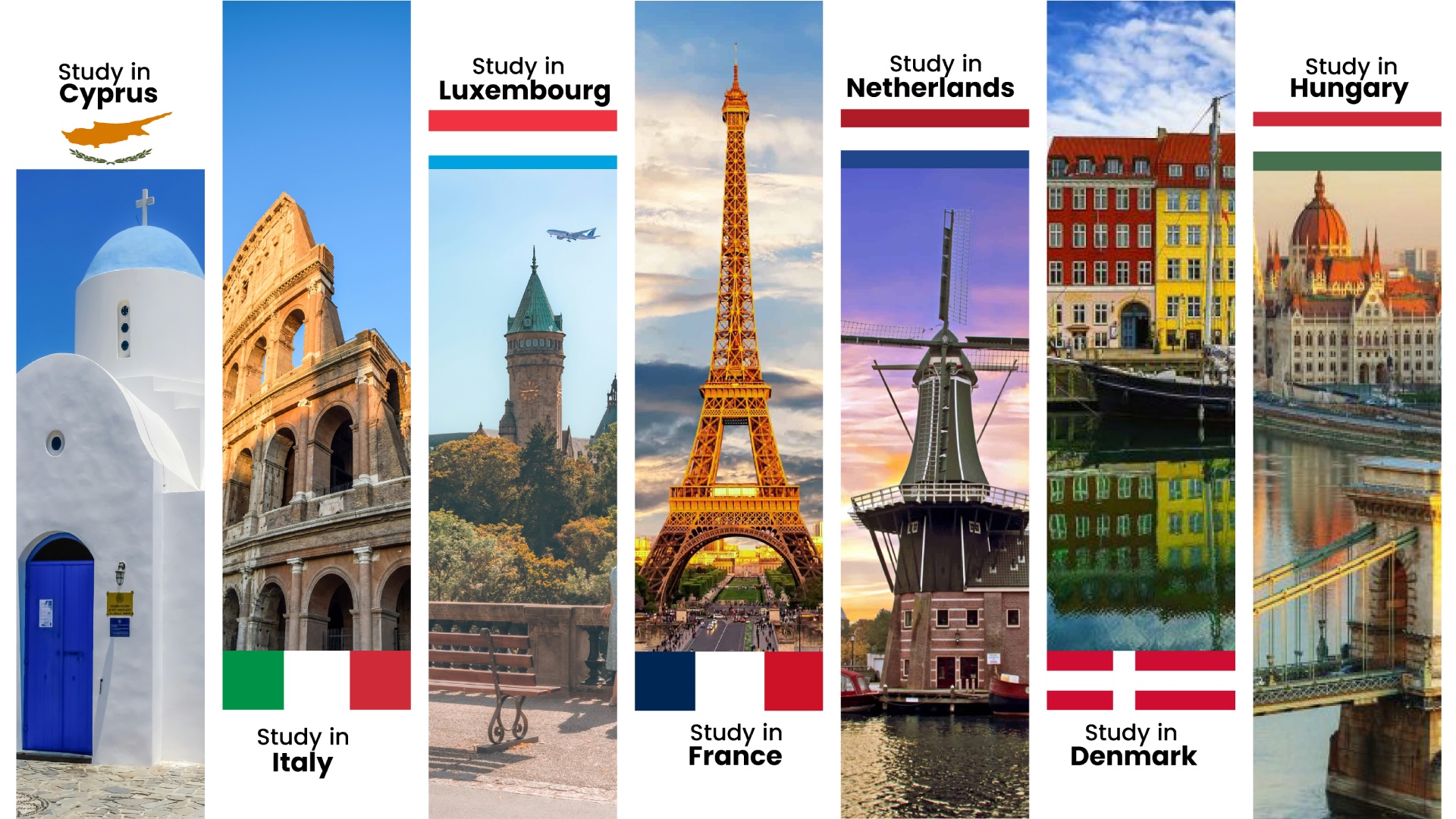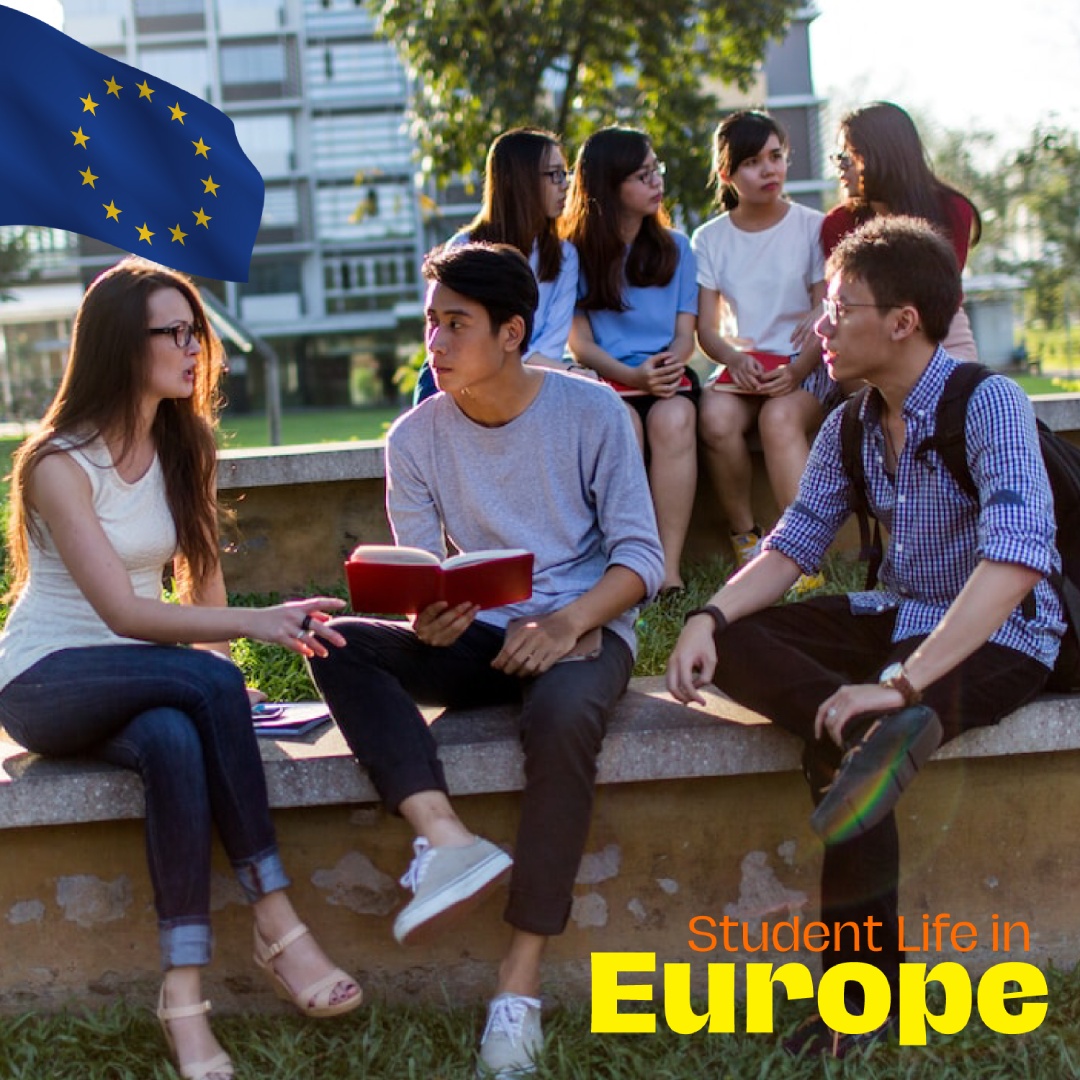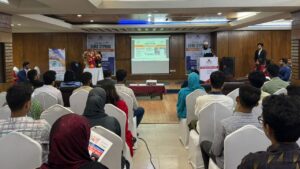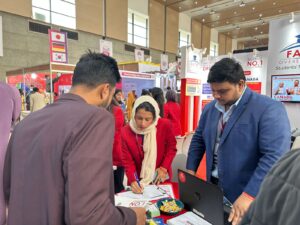Study in Europe from Bangladesh offers a wealth of opportunities. European universities provide world-class education and diverse cultural experiences.
Students from Bangladesh are increasingly choosing Europe for higher education. Study in Europe at prestigious universities and a wide range of programs. Affordable tuition fees and various scholarships make it an attractive student destination. The Bologna Process ensures quality and compatibility across institutions. Graduates benefit from globally recognized degrees and industry-leading experiences
Studying in Europe also offers exposure to different cultures and languages, enhancing personal growth. The application process is straightforward, with many resources available to guide students. Whether pursuing undergraduate or postgraduate studies, Europe offers a rich, rewarding educational experience. Students from Bangladesh have plenty of room to excel academically and personally in this vibrant, diverse continent.
Why Study In Europe?

Study in Europe from Bangladesh offers numerous opportunities for students. The continent is known for its rich history, diverse cultures, and advanced educational systems. Let’s explore why studying in Europe can be an excellent choice for Bangladeshi students.
Quality Education
Europe is home to some of the world’s best universities. These institutions are known for their high academic standards and innovative and industry-oriented teaching methods. Many European universities rank high in global education rankings. Here are some key points about the quality of education in Europe:
- Research Excellence: European universities stand out in the world’s research and innovation excellence.
- Experienced Faculty: Professors and lecturers have extensive experience and are often industry leaders.
- Modern Facilities: Campuses are well-equipped with state-of-the-art labs and libraries, with small classrooms and personalized teaching.
- Global Recognition: Degrees from European universities are recognized worldwide.
For example, universities like Oxford, Cambridge, and ETH Zurich are renowned for their academic excellence and research output.
Diverse Academic Programs
European universities offer a wide range of academic programs. Students can choose from numerous disciplines and specializations. This variety ensures that there is something for everyone. Some popular fields of study include:
- Engineering and Technology
- Business and Management
- Medicine and Health Sciences
- Arts and Humanities
- Social Sciences
Additionally, almost all programs are available in English in all countries, making it easier for international students to study. Dual degree programs and exchange opportunities are also common, providing students with a broad educational experience.
Cultural And Language Exposure
Studying in Europe offers a unique cultural experience. Students get to live in countries with rich histories and diverse traditions. This exposure helps in personal growth and broadens one’s worldview. Benefits of cultural and language exposure include:
- Learning New Languages: Students have the opportunity to learn languages like French, German, or Spanish.
- Innovation and New Ideas: Being in a multicultural exposure helps the students to understand different perspectives to think about innovations and ideas.
- International Friendships: Making friends from different countries and backgrounds.
- Cultural Events: Participating in local festivals, traditions, and customs.
- Travel Opportunities: Exploring neighboring countries and famous landmarks.
Living in Europe provides students with a chance to become more adaptable and culturally aware, skills that are valuable in today’s globalized world.
Benefits Of Studying In Europe
Studying in Europe offers Bangladeshi students a wealth of opportunities. From high-quality education to cultural diversity, the benefits are immense. This blog post delves into the numerous advantages of pursuing higher education in Europe.
Lower Tuition Fees
European universities often have lower tuition fees compared to other parts of the world. This makes it an attractive destination for students from Bangladesh. Most of the European countries offer affordable education without compromising on quality. Here are some key points to consider:
- Public universities in countries like Germany and Norway offer tuition-free education.
- Even in countries with fees, most of the countries offer one-fourth the cost than in the US or Australia.
- Living expenses in many European cities are also reasonable. In some countries, it is lower than in Bangladesh.
Below is a comparison table of average annual tuition fees in different countries:
| Country | Average Tuition Fee (EUR) per year |
| Germany | 0 – 4000 |
| Norway | 0-11000 |
| France | 350 – 9000 |
| Italy | 0 – 3500 |
Scholarship Opportunities
Europe is known for its vast array of scholarship opportunities for international students. These scholarships can significantly reduce the financial burden on Bangladeshi students. Consider the following points:
- Erasmus Mundus Scholarships cover tuition, travel, and living expenses.
- Many countries offer government-funded scholarships for international students.
- Universities provide merit-based scholarships for outstanding students.
Below is a list of popular scholarships available:
- DAAD Scholarships in Germany
- Chevening Scholarships in the UK
- Swedish Institute Scholarships in Sweden
- Eiffel Excellence Scholarship Program in France
High Employability
European education is highly regarded worldwide, leading to high employability for graduates. This is a significant advantage for Bangladeshi students looking to secure a bright future. Key benefits include:
- European degrees are recognized globally.
- Universities focus on practical skills and real-world applications.
- Many universities have strong networks with industry, offering internships and job placements.
Here are some statistics on employability:
| Country | Graduate Employability Rate (%) |
| Germany | 91.5 |
| Netherlands | 93.2 |
| Sweden | 88.10 |
| France | 90 |
| Malta | 95.80 |
Travel Opportunities
Studying in Europe offers the chance to explore a continent rich in history and culture. Bangladeshi students can enjoy numerous travel opportunities during their stay.
Some highlights include:
- Europe’s Schengen visa allows travel across 26 countries.
- Low-cost airlines and trains make travel affordable.
- Students can experience a variety of cultures and languages.
Popular travel destinations for students include:
- Paris, France
- Rome, Italy
- Barcelona, Spain
- Amsterdam, Netherlands

Popular Study Destinations In Europe
Europe is a dream destination for many Bangladeshi students. The continent boasts a rich cultural heritage and world-class education systems. Studying in Europe offers diverse experiences, top-tier universities, and vibrant student life. Let’s explore some popular study destinations in Europe.
United Kingdom
The United Kingdom is a top choice for Bangladeshi students. Universities like Oxford, Cambridge, and Imperial College London are world-renowned.
- High-Quality Education: UK universities offer excellent education and research facilities.
- Diverse Courses: A wide range of courses in various disciplines is available.
- Cultural Exposure: The UK is a melting pot of cultures, enhancing the student experience.
Scholarships and Funding: There are many scholarships available for international students. Some popular ones include:
| Scholarship | Description |
| Chevening Scholarship | Offers full financial support for one-year master’s degrees. |
| Commonwealth Scholarship | Available for students from Commonwealth countries. |
Germany
Germany is famous for its engineering and technology programs. Many universities offer courses in English.
- No Tuition Fees: Most public universities do not charge tuition fees.
- Research Opportunities: Germany is known for its research and innovation.
- Quality of Life: Germany offers a high standard of living and safety.
Top Universities: Some leading universities include:
- Technical University of Munich
- University of Heidelberg
- Humboldt University of Berlin
France
France is home to prestigious institutions like Sorbonne University and École Normale Supérieure.
- Rich Culture: France offers a blend of modernity and tradition.
- Affordable Education: Tuition fees are relatively low compared to other countries.
- Language Advantage: Many programs are available in English.
Scholarship Programs: Some scholarships for international students include:
| Scholarship | Description |
| Eiffel Excellence Scholarship | For top international students in master’s and PhD programs. |
| Charpak Scholarship | Available for Indian students, but Bangladeshi students can apply under special conditions. |
Netherlands
The Netherlands is known for its innovative education system. Dutch universities rank high in global lists.
- English-Taught Programs: Most universities offer programs in English.
- High Academic Standards: Dutch education is known for its quality and research.
- Multicultural Environment: The Netherlands is home to students from all over the world.
Top Universities: Notable institutions include:
- Delft University of Technology
- University of Amsterdam
- Leiden University
Sweden
Sweden offers a unique education system that encourages critical thinking and creativity.
- Innovative Learning: Swedish universities focus on innovation and sustainability.
- English Programs: Many courses are available in English.
- High Quality of Life: Sweden is known for its high living standards and safety.
Scholarships: Some scholarships for international students include:
| Scholarship | Description |
| Swedish Institute Scholarships | For global professionals in master’s programs. |
| Visby Programme Scholarships | For master’s level students from specific countries, including Bangladesh. |
Spain
Spain is a popular destination due to its vibrant culture and excellent education system.
- Affordable Education: Tuition fees and living costs are lower compared to other European countries.
- Diverse Programs: Universities offer a variety of programs in English and Spanish.
- Rich Culture: Spain offers a rich cultural experience with its history, festivals, and cuisine.
Top Universities: Leading institutions include:
- University of Barcelona
- Complutense University of Madrid
- Autonomous University of Barcelona
Admission Requirements and Process
Studying in Europe from Bangladesh offers an enriching experience. The admission requirements and process can seem complex, but understanding each step makes it manageable. This guide breaks down everything you need to know, from language proficiency to the visa process.
Language Proficiency
Language proficiency is crucial for studying in Europe. Most European universities require proof of language skills. English-taught programs usually ask for IELTS or TOEFL scores. Minimum scores often look like this:
- IELTS: 5.5 to 7.5
- TOEFL: 80 to 100
Some countries, like Germany or France, may require proficiency in their native language. For German-taught programs, the TestDaF or DSH exams are common. French programs might ask for DELF or DALF certificates. Preparing for these tests early ensures you meet the requirements.
Universities often provide language courses for students needing extra help. Language proficiency is not just for admission; it helps in daily life and study efficiency. So, focus on improving language skills before applying.
Academic Qualifications
Academic qualifications vary by country and university. Most European universities require a Higher Secondary Certificate (HSC) or equivalent for undergraduate programs. Some countries like the UK, Norway, and Finland require 13 years of Education for direct entry to Bachelor programs. For postgraduate programs, a Bachelor’s degree is necessary. Here is a table summarizing common qualifications:
| Program Level | Required Qualification |
| Undergraduate | Higher Secondary Certificate (HSC) or A-levels |
| Postgraduate | Bachelor’s Degree |
Some programs may have specific subject requirements. For example, engineering courses may require strong grades in mathematics and physics. Universities also look at GPA or sometimes at the Percentage of the result regardless of the CGPA earned. Aim for a GPA above 3.0 on a 4.0 scale for better chances. Research each university’s requirements carefully to ensure you qualify.
Application Procedure
The application procedure involves several steps. First, research and choose universities. Then, gather the required documents:
- Academic transcripts
- Language proficiency test scores
- Statement of Purpose (SOP)
- Letters of Recommendation (LORs)
- Passport copy
Apply through the university’s online portal or a centralized system like UCAS for the UK. Pay the application fee and submit your application. After submission, you may be invited for an interview, especially for postgraduate programs. Prepare well for this stage to make a good impression.
Keep track of application deadlines as they vary. Some universities have multiple intakes, so check which one suits you best. Stay organized and ensure all documents are accurate and complete.
Visa Process
The visa process is a critical step. First, receive an admission letter from a European university. Then, apply for a student visa at the respective country’s embassy in Bangladesh. The required documents typically include:
- Valid passport
- Admission letter
- Proof of financial means
- Health insurance
- Visa application form
Some countries may require a visa interview. Prepare your documents and answers. Visa processing times vary, so apply early. Here is a quick overview of common visa types:
| Country | Visa Type |
| Germany | National Visa (D Visa) |
| France | Student Visa (VLS-TS) |
| Netherlands | Provisional Residence Permit (MVV) |
Ensure you meet all requirements to avoid delays. Once your visa is approved, make travel arrangements and plan your departure. Stay updated with any changes in visa policies to ensure smooth processing.
Cost Of Living and Financial Planning
Studying in Europe from Bangladesh is an exciting journey. It opens doors to world-class education and cultural experiences. But, planning your finances is crucial. Understanding the cost of living and effective financial planning ensures a smooth study experience. Here, we break down the key aspects of living costs in Europe.
Accommodation
Accommodation is a significant expense for students. Finding affordable housing is essential. There are different options available:
- University Dormitories: These are often the most affordable option. They provide a community feel and are close to campus.
- Private Apartments: Renting an apartment offers more privacy. But, it’s usually more expensive.
- Shared Housing: Sharing an apartment with other students can reduce costs significantly.
Here is a table showing average monthly rental costs in popular European cities:
| City | Average Monthly Rent (in EUR) |
| Berlin | 500-800 |
| Paris | 700-1000 |
| Rome | 600-900 |
| Madrid | 400-700 |
Living Expenses
Living expenses include rent, food, transportation, and other daily needs. Planning your budget helps in managing these costs effectively. Below are some average monthly expenses:
- Rent: 400-600 EUR
- Food: 150-300 EUR
- Transportation: 50-100 EUR
- Utilities: 100-200 EUR
- Entertainment: 50-150 EUR
Here is a sample monthly budget for a student in Europe:
|
Expense |
Cost (in EUR) |
|
Rent |
500 |
|
Food |
200 |
|
Transportation |
80 |
| Utilities |
150 |
| Entertainment |
100 |
| Total |
1030 |
Part-time Jobs
Many students work part-time to support themselves financially. Part-time jobs help cover living expenses and provide hands-on work experience. Popular part-time job opportunities include:
- Cafes and Restaurants: Waiting tables, barista jobs, and kitchen help.
- Retail Stores: Working as cashiers or stock clerks.
- On-campus Jobs: Library assistants, research assistants, and different administrative roles.
Most European countries allow students to work up to 20 hours per week during term time. During holidays, students are allowed to work full-time. Earning from part-time jobs can significantly ease financial stress. The average hourly wage ranges from 8 to 12 EUR, depending on the job and location. Here is a table showing potential monthly earnings from part-time work:
|
Hours Worked (Per Week) |
Hourly Wage (in EUR) | Monthly Earnings (in EUR) |
|
20 |
10 | 800 |
| 15 | 10 |
600 |
|
10 |
10 |
400 |
Student Life in Europe
Studying in Europe from Bangladesh offers students a unique and enriching experience. The diverse cultures, advanced educational systems, and historic landmarks make Europe a popular destination for Bangladeshi students. One of the most exciting aspects is the vibrant student life in Europe. It surrounds a variety of activities and services that enhance the overall educational experience.
Campus Facilities
European universities possess state-of-the-art campus facilities that cater to the needs of international students. These facilities ensure a comfortable and productive environment for learning and personal development.
Some common campus facilities include:
- Modern Libraries: Equipped with vast collections of books, journals, and digital resources.
- Laboratories: Cutting-edge labs for research in various fields like science, engineering, and medicine.
- Sports Complexes: Indoor and outdoor facilities for sports like basketball, football, and swimming.
- Accommodation: On-campus and off-campus housing options with all necessary amenities.
- Dining Halls: Offering a variety of international cuisines, including halal options for Bangladeshi students.
Here is a quick comparison of typical campus facilities:
| Facility | Details |
| Library | 24/7 access, digital and physical resources |
| Laboratories | Advanced equipment, specialized research areas |
| Sports Complex | Gym, swimming pool, football field |
| Accommodation | Single and shared rooms, furnished, internet access |
| Dining Halls | Multi-cuisine, halal food options |
Extracurricular Activities
Extracurricular activities play a crucial role in student life in Europe. They help students develop new skills, make friends, and enjoy their time outside the classroom.
Some popular extracurricular activities include:
- Student Clubs: Universities have various clubs like drama, debate, music, and photography.
- Sports Teams: Join sports teams for football, basketball, tennis, and more.
- Cultural Events: Participate in festivals, cultural nights, and international student days.
- Workshops and Seminars: Attend sessions on personal development, career guidance, and skill-building.
- Volunteer Opportunities: Engage in community service and social work projects.
These activities not only provide a break from academic stress but also help in building a strong network and improving interpersonal skills.
Student Support Services
European universities are committed to ensuring the well-being of their students. They offer a wide range of student support services that assist in various aspects of student life.
Key student support services include:
- Counseling Services: Professional counselors provide support for mental health and emotional well-being.
- Academic Advising: Advisors help students with course selection, academic planning, and study strategies.
- Language Support: Language courses and workshops to help international students improve their language skills.
- Health Services: On-campus clinics offer medical care and health advice.
- Career Services: Assistance with resume writing, interview preparation, and job placements.
Challenges And Tips for International Students
Studying in Europe from Bangladesh offers a wealth of opportunities, but it also presents several challenges. International students must navigate cultural differences, language barriers, financial management, and social integration. Below, we discuss these challenges and provide tips to make your European study experience successful and enjoyable.
Cultural Adjustment
Moving to a new country involves significant cultural adjustments. Understanding European customs and traditions is essential for a smooth transition. Here are some tips to help:
- Learn about local customs and etiquette to avoid misunderstandings.
- Participate in cultural exchange programs to gain deeper insights.
- Attending local festivals and events to immerse yourself in the culture.
Homesickness
Stay connected with family and friends through regular calls and messages. Join student groups from your home country if available. This will help you feel less isolated and more supported. Understanding academic culture is also crucial. European universities may have different teaching styles and expectations. Be proactive in seeking help from professors and classmates. Utilize university resources such as counseling services for additional support.
Language Barrier
Language can be a significant barrier for Bangladeshi students in Europe. Many countries offer courses in English, but daily life may require knowledge of the local language. Here are some strategies to overcome this challenge:
- Enroll in language courses offered by your university.
- Use language learning apps like Duolingo or Babbel.
- Practice speaking with locals to improve fluency.
Language proficiency can affect your academic performance. Ensure you meet the language requirements of your chosen program. Seek help from language tutors or join study groups for better understanding. Don’t hesitate to ask for clarification if you don’t understand something. Most people will appreciate your effort to learn their language and will be happy to assist.
Managing Finances
Managing finances efficiently is vital for international students. Creating a budget helps track expenses and avoid overspending.
- Track your monthly expenses using budgeting apps.
- Look for student discounts on travel, food, and entertainment.
- Consider part-time work to supplement your income.
Living costs vary across Europe. Research the cost of living in your destination city. Choose affordable accommodation options such as student dormitories or shared apartments. Scholarships and financial aid can significantly reduce your expenses. Apply for scholarships offered by universities, governments, and private organizations. Open a local bank account to avoid foreign transaction fees and manage your money more effectively.
Building A Social Network
Building a social network is crucial for a fulfilling study experience. Making friends helps you feel connected and supported. Here are some ways to build your social network:
- Join student clubs and societies related to your interests.
- Attend orientation events to meet fellow students.
- Participate in social and cultural activities organized by your university.
Volunteer for community service projects to meet new people and contribute to your local community. Use social media platforms to connect with other international students. Don’t be afraid to initiate conversations and invite people for coffee or study sessions. Building relationships takes time, so be patient and open-minded. Remember, everyone is in the same boat and looking to make friends.
Student Experiences From Bangladeshi Students in Europe
Bangladeshi students in Europe have a range of experiences. They adapt to new cultures and educational systems. Here are some common themes from their stories (We are withholding their identity to prioritize their safety and confidentiality):
- Adapting to a new culture: Students often talk about cultural differences. They learn new languages and customs. This helps them grow personally and professionally.
- Quality of education: European universities offer world-class education. Bangladeshi students appreciate the advanced facilities and diverse courses.
- Support systems: Many universities have support services. These services help international students with housing, language, and academic support.
- Networking opportunities: Students meet people from around the world. This expands their professional and social networks.
These experiences highlight the benefits of studying in Europe. They show how Bangladeshi students can thrive in a new environment.
Embarking on a study journey in Europe offers immense benefits for Bangladeshi students. The cultural exposure, quality education, and career opportunities are unmatched. Start your European education adventure today and open doors to a brighter future. Investing in education abroad can truly transform your life and career prospects.








